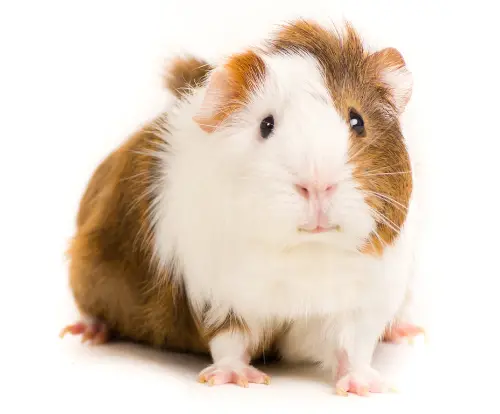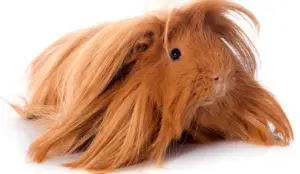It might be quite frightening when your guinea pig pees strangely smelling or appearing. Most likely, you’re attempting to determine what is wrong with your furry pet.
To prevent and treat diseases and illnesses in your animals, it is essential to understand what is regarded as “normal” for them. You will learn what is typical, worrisome, and the possible causes of your pig’s strange peeing with this guide.
What Are The Different Colors Of Guinea Pig’s Urine and Its Meaning?
Normal Urination
- Light Yellow/Clear
A guinea pig’s typical urine will be clear or slightly yellow in color. There are trace levels of calcium present if the urine is slightly hazy. Additionally, clear pee may indicate that your guinea pig is consuming too much water, which could result in renal issues.
- Orange
Your guinea pig’s pee occasionally turns orange after being exposed to the air. Orange urine in guinea pigs is common and shouldn’t raise any red flags. Because urine contains substances called porphyrins that aid in the production of hemoglobin, it affects young male guinea pigs the most frequently.
- Reddish or pink
Particularly if the pee remains pink or red after drying, a guinea pig’s food is typically the cause of its pink or crimson urine. If fed in excess, foods including tomatoes, bananas, beets, and carrots will create pink urine in guinea pigs. Check your guinea pig’s urine frequently to see if the color continues, and consider the last time your pet ate.
Abnormal Urination
- White
Blood that is white and hazy sometimes feels powdered or grit. If the pee is white, your pet’s body has too much calcium, and you will need to adjust your guinea pig’s diet.
Urinary tract or bladder infections can be detected by grit in the urine. Untreated urinary tract infections might lead to bladder stones or inflammation. A veterinarian will recommend the right antibiotics to treat the infection following a urinalysis.
- Dark Red
Internal bleeding is present if the urine is dark red when moist and dark brown when dry. This kind of bleeding can be brought on by kidney disease, infections, urinary stones, and other medical issues. It is essential to take your cavy to the doctor right away because it can be challenging to pinpoint the precise cause.
What Are Common Diseases And Illnesses Related To Abnormal Urination?
To make an accurate diagnosis and receive effective therapy, your guinea pig must be examined by your veterinarian and submitted to any required tests. Understanding your pet’s symptoms is crucial to figuring out what’s wrong and making sure their problem is treated or fixed. The disorders listed below are some of the most typical causes of irregular urine in guinea pigs, while other potential medical issues may also play a role.
- UTIs: Urinary Tract Infections
A form of bladder infection known as a urinary tract infection is brought on by skin, fur, or anus germs that enter the urethra and start to multiply. Some signs and symptoms may include pain and difficulty urinating, blood in the urine, anorexia, weight loss, fever, and lethargic behavior. To accurately identify the condition and start treatment, your guinea pig’s veterinarian may do an x-ray and urinalysis. Recurring infections are frequent and can cause the urinary system to become permanently damaged as well as more severe symptoms.
- Urinary Calculi
This calculus, which is more popularly known as urinary stones, is mostly formed of calcium carbonate, however various other salts and minerals can also contribute to its formation. If untreated, these urinary stones can result in excruciating pain and suffering, infections, obstructions, and long-term harm to the urinary tract. Although the exact etiology of this ailment is unknown, high calcium diets and genetic predisposition are linked to it. These “stones” can occasionally be removed without surgery or by medication, but surgery may be necessary for larger stones.
How To Deal With Guinea Pigs That Have White Pee?
It’s wise to regularly check your guinea pig’s pee. Although white urine is frequently acceptable, you should pay attention to whether the color changes. This can be a sign of a health issue.
Make sure your guinea pig is getting enough water if you notice white pee. Hay can also be included to their diet to assist maintain a healthy urinary system.
There is no need for alarm if the color does not alter and your guinea pig continues to drink and urinate properly. To rule out any health issues, you should take your guinea pig to the vet if you find that it is peeing more frequently or consuming less water.
The most crucial thing to keep in mind is that guinea pigs are extremely sensitive to stress. Therefore, it’s always preferable to err on the side of caution and take them to the vet to be examined if you detect any changes in their behavior or look.
How To Treat UTI In Guinea Pigs?
It’s critical to seek medical attention if the poop of your guinea pig is milky in order to identify the precise cause. To determine whether a urinary tract infection, too much calcium or phosphorus or both, the veterinarian will do a urinalysis.
Your guinea pig may develop bladder stones that clog the urine tract and require antibiotics or surgery to remove them. Additionally, keeping your guinea pig hydrated will help guard against infections and bladder sludge.
By doing these things, the urine in your guinea pig will start to normalize.
Medication
The veterinarian will give your pet medication if a urinary tract infection is the cause of the symptoms. You totally eliminate the illness, make sure to correctly administer the medications. Inappropriate antibiotic use can also make your guinea pig resistant to them, making it harder to treat subsequent infections.
Surgery
In severe cases of bladder stones, surgery may be required to guarantee that the calculi are completely eliminated. Females with minor calculi may use bladder lavage.
How To Prevent Abnormal Urination In Guinea Pigs?
Popular as little pets, guinea pigs may be wonderful additions to a household. Although they are typically simple to look after, there are a few things you should be aware of to keep your guinea pig happy and healthy. We’ll go through some pointers on how to do that in this article.
- Make sure your guinea pig has access to plenty of fresh water. A fresh supply of water should always be available for guinea pigs, who require around a cup each day. A bowl or bottle attachment that hangs from the side of their cage is another option for providing them with water.
- Keep the space where your guinea pigs live dry and spotless. Regularly replace their bedding, and daily sweep up any food or animal waste. By doing this, you’ll be able to keep your pet healthy and stop the spread of pathogens and pests like fleas.
- Provide healthy food for your guinea pig. Hay, fresh produce, and pellets should always be available to guinea pigs. Given that obesity in guinea pigs is a prevalent issue, take care not to overfeed them. For more details on the ideal diet for guinea pigs, check with your veterinarian or an online resource.
- Maintain a dry and clean environment in the space you use for your guinea pigs. Regularly change their bedding, and daily sweeping is required to remove any food or animal waste. By doing this, you can maintain your pet’s health and stop the spread of disease or pests like fleas.
- Exercise your guinea pig frequently. Make sure to provide your guinea pigs a big cage or pen so they have room to run about and play. For supervised playing, you can also let them run around in a secure room or part of your house.
- Visit the veterinarian often to have your guinea pig examined. Guinea pigs require routine care from a veterinarian, just like any other pet. This covers shots, physicals, and nail care. Make sure you locate a veterinarian with knowledge of guinea pig care.
Recap
Of course, every owner of a guinea pig is interested in learning what typical guinea pig pee looks like. They can identify health problems thanks to this. The observations regarding the urine, however, are not set in stone.
As long as your guinea pig’s poop is clear, it is healthy. Due to calcium carbonate and ammonium phosphate crystals in the urine, it could be thick, hazy, and white. But having too much calcium is not a good thing. Blood can be detected in pee by red streaks or pinkish urine color.
Changes in color are not markers of health. One should pay close attention to the urine’s consistency because it is crucial.







